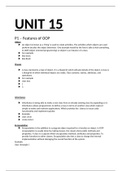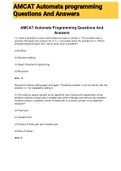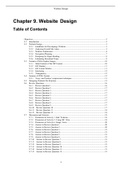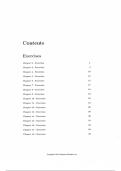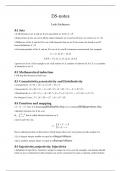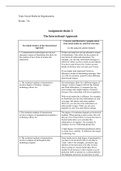Introduction to psychology
Attachment and the development of social relationships
What is attachment?
Attachment
- A strong emotional bond formed between a child and their mother, father or
primary carer
Separation anxiety
- The anxiety a child experiences when separated from the mother or primary
carer
Stranger anxiety
- The anxiety children experience when people who are unfamiliar to them are in
their presence.
Why study attachment?
Early relationship with caregiver (usually mother) is crucial throughout development
- It works as a template for other social relationships including peer and romantic
relationships
- It predicts other outcomes including educational performance and mental health
- It has important implications for parenting and educational practice.
Konrad Lorenz (1903-1989)
Papa Goose.
Critical periods
A critical period is a time frame in which certain kinds of experiences are essential for
normal development
, A sensitive period is a time frame in which specific experiences are optimal for
development to occur in a typical way.
Harry Harlow (1905-1981)
Took baby monkeys away from their mothers
Gave them a fake wire monkey that contained food and a soft cuddly monkey that
didn’t provide food
Baby monkeys chose soft monkey as their mother.
Early attachment theory
John Bowlby (1907-1990)
Maternal deprivation hypothesis
- If children are deprived of contact with the mother during a critical period when
the primary attachment relationship is being formed (6 months to 3 years), there
will be negative consequences to emotional and mental health.
Bowlby’s attachment phases
Pre-attachment: 0-2 months
- The infant shows little differentiation in responses to mother and other people,
familiar or unfamiliar
Early attachment: 2-7 months
- The infant begins to recognise mother, gradually more likely to be comforted by
her
Separation protest: 7-9 moths to 2 years
- The infant seeks to maintain proximity with mother, is wary of strangers and
protests when separated
Goal-corrected: 2-3 years and up
- The infant has more abstract representations of attachment (trust, affection,
approval), begins to understand mother’s needs, and is increasingly
independent.
Attachment and the development of social relationships
What is attachment?
Attachment
- A strong emotional bond formed between a child and their mother, father or
primary carer
Separation anxiety
- The anxiety a child experiences when separated from the mother or primary
carer
Stranger anxiety
- The anxiety children experience when people who are unfamiliar to them are in
their presence.
Why study attachment?
Early relationship with caregiver (usually mother) is crucial throughout development
- It works as a template for other social relationships including peer and romantic
relationships
- It predicts other outcomes including educational performance and mental health
- It has important implications for parenting and educational practice.
Konrad Lorenz (1903-1989)
Papa Goose.
Critical periods
A critical period is a time frame in which certain kinds of experiences are essential for
normal development
, A sensitive period is a time frame in which specific experiences are optimal for
development to occur in a typical way.
Harry Harlow (1905-1981)
Took baby monkeys away from their mothers
Gave them a fake wire monkey that contained food and a soft cuddly monkey that
didn’t provide food
Baby monkeys chose soft monkey as their mother.
Early attachment theory
John Bowlby (1907-1990)
Maternal deprivation hypothesis
- If children are deprived of contact with the mother during a critical period when
the primary attachment relationship is being formed (6 months to 3 years), there
will be negative consequences to emotional and mental health.
Bowlby’s attachment phases
Pre-attachment: 0-2 months
- The infant shows little differentiation in responses to mother and other people,
familiar or unfamiliar
Early attachment: 2-7 months
- The infant begins to recognise mother, gradually more likely to be comforted by
her
Separation protest: 7-9 moths to 2 years
- The infant seeks to maintain proximity with mother, is wary of strangers and
protests when separated
Goal-corrected: 2-3 years and up
- The infant has more abstract representations of attachment (trust, affection,
approval), begins to understand mother’s needs, and is increasingly
independent.


